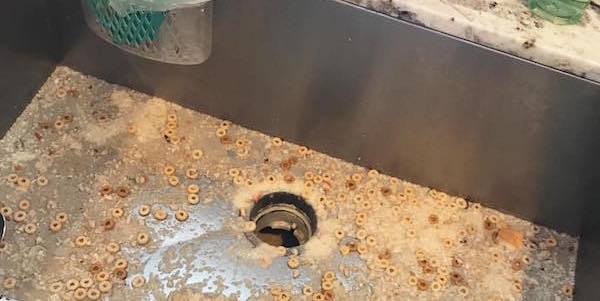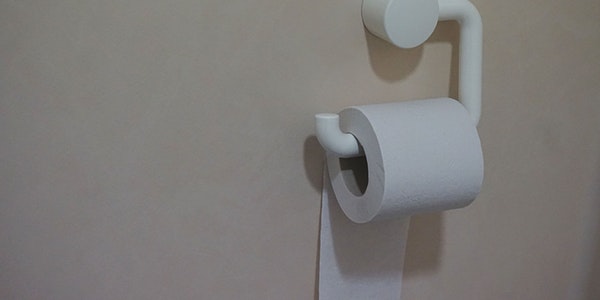When the water in your kitchen sink refuses to drain or your toilet clogs, it can feel like a case of bad luck. The cause of these unfortunate situations is more likely to be a collection of items getting stuck in the pipes and blocking the water from smoothly running down. Putting everyday products down the drain could be the root of your all of your plumbing troubles.
There are several signs that your kitchen sink’s drain is clogged and needs some maintenance. When the basin is filled with water for cleaning dishes or washing produce, it drains slowly or the water doesn’t go down at all. If you smell a foul odour similar to rotting food that doesn’t come from your garbage can or compost bin, it could be coming through the sink.
Another red flag is when you can hear strange gurgling or bubbling noises coming from down the drain. You can try to fix the clog with a clean plunger but if it doesn’t budge or if the clog keeps returning, you should seek expert plumbing services in Toronto to address the issue right away. A professional will assess the situation to determine the appropriate solution, like using a drain snake to dislodge the clog or water jetting to break away the build-up.
You can prevent this situation from occurring by using a sink strainer to trap and collect pieces of food as you are washing or rinsing off dishes and then empty it into your compost bin. Run hot water down the drain on a weekly basis and clean it using natural solutions like white vinegar and baking soda every once in a while.
The best way to fend off clogged drains is to stop treating your sink as garbage disposal because there are lots of food products that will cause blockages. One common mistake is pouring grease, oils and fats into the sink instead of putting them into the compost — even if they are smooth as liquids, they will eventually cool and stick to the insides of pipes. Other than being careful with grease, oils and fatty ingredients like butter and lard, you should make note of these additional items to never put down the drain of your kitchen sink:
- Eggshells
- Coffee grounds
- Flour
- Stickers from produce
- Starchy foods like pasta, rice or potatoes
- Cereal
- Bones
Similar to your kitchen sink, you can tell when your toilet drain is clogging when you hear gurgling or sputtering noises or smell an intense odour. A more immediate sign is when the water goes down at a slower rate when you flush it, or if the water doesn’t go down at all. If there is a significant obstruction, more water will enter the bowl and can cause an overflow. If a plunger has not fixed the clog or the problem is reoccurring, you need to call in a professional plumber.
They can come over to your house to clear out the clog, even if it happens at an odd time — you can call us anytime because our emergency services are available for 24 hours a day, 7 days a week and 365 days a year. If you want to replace your old toilet, they can help you select a replacement, deliver it to your home and install it for you. They can also offer handy advice for regular maintenance and care so that your new toilet stays in top shape.
One of the top reasons why your toilet clogs or backs-up on a regular basis is that the residents of your house have been consistently flushing items that they are not supposed to and blocking up the drainage. Anything that is not human waste or toilet paper should be put in the garbage can, the compost basin, the recycling bin or an alternative form of disposal. Even items that are commonly believed to be safe to put down the toilet should be questioned, like moist towelettes and baby wipes.
Companies that manufacture these products label them as flushable, even though there is mounting evidence that they are not as easily disposable as they appear. Locations across Canada have complained about flushable wipe problems because the products have caused major damage to sewage systems and tremendous costs for clean-up — an expert from Ontario’s Municipal Enforcement Group estimated that the cleaning efforts cost $250 million for the country’s utilities. The best way to deal with any moist wipe is to throw it in the garbage after it has been used, whether the advertisement claims it is flushable or not.
Other items that are notable for creating plumbing problems are menstrual hygiene products. Cotton tampons, pads or liners are incredibly absorbent and will expand when they enter the pipes. If these products cause a blockage, using a plunger will only send them further down the drain, which could make your problem much harder to fix — you will need to hire a local plumber to find the obstruction and clear out the pipes so that you can use the bathroom again.
Anyone using these specific items should wrap them in toilet paper when they are done with them and put them in the trash. They are not completely biodegradable and should be sent to a landfill, not to the local wastewater system. Other than baby wipes and menstrual products, you should make sure that you remember these things to never flush down the toilet so that you can avoid frustrating clogs and costly damages:
- Kitty litter
- Hair
- Band-aids
- Q-Tips
- Cotton balls
- Makeup-removal wipes
- Diapers
- Dental floss
- Paper towel
- Tissues
It’s possible that you have never put these items down the drain, and that the other residents are making these errors. Talk to every housemate about what can go down the kitchen sink and the bathroom toilets — this is especially important for young children, who will not understand the financial consequences of blocked drains. When everyone under the roof knows how to treat the plumbing properly, you will instantly notice a difference.






